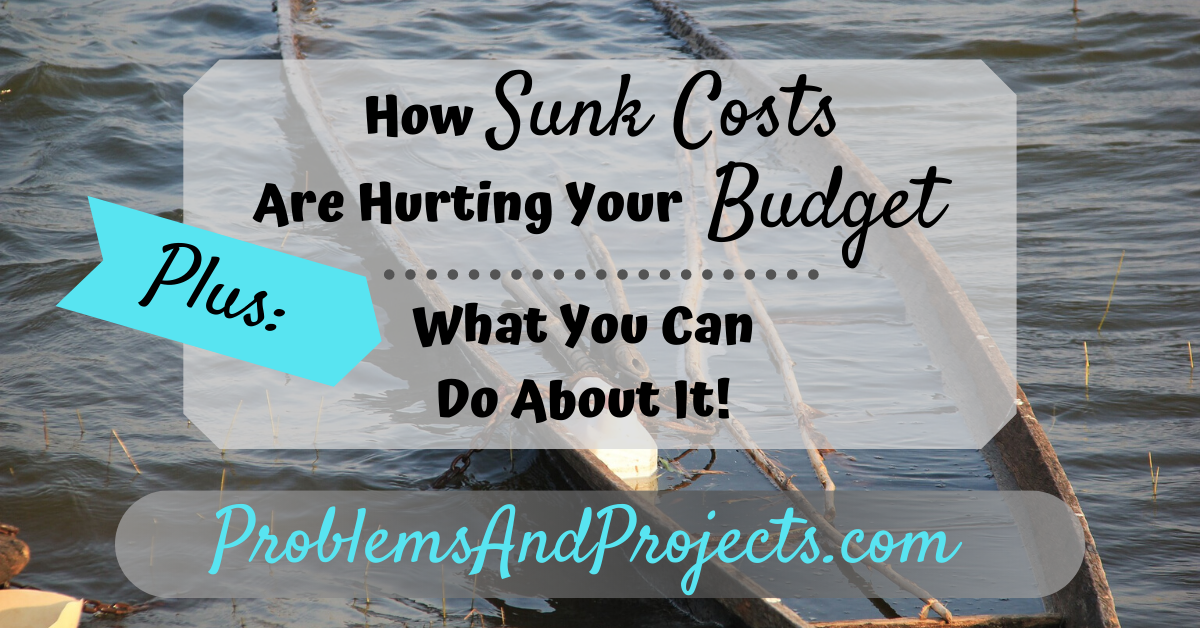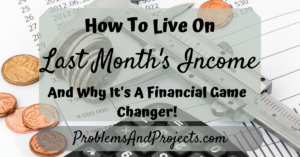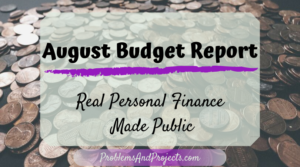Happy February, everyone! I feel like I haven’t posted in forever. 2020 is turning out to be a pretty crazy time for us at P&P. We all had the flu for the better part of January. Honestly, we still haven’t fully recovered. Throw in an injury or two on top of that. Then, of course, there was the move! If you read our January Budget Report, you already know about that transition … We sold the pit and bought a new house! It was definitely bitter sweet, but I think it was the best choice for us. I also think that our reasoning makes for a great transition into today’s topic. I want to talk about how sunk costs are hurting your budget.
Problems and Projects is a participant in the Amazon Services LLC Associates Program, an affiliate advertising program designed to provide a means for sites to earn advertising fees by advertising and linking to Amazon.com. This post may contain affiliate links through Amazon or other affiliate programs. If you make a purchase through an affiliate link, I make a small commission at no additional cost to you. All opinions are my own and I only recommend products that I believe in. Read my full disclosure here. Thank you for your support!
What Are Sunk Costs?
Let’s get started with the most important part of any new topic. In order to know if you’re falling victim to sunk costs, you need to know what they are. It’s a pretty simple concept, actually. Sunk costs are often discussed in the business world and are described as any money that you have already spent and can’t get back.
This concept is most often used to help people decide if a certain business venture is worth trying to salvage, or if it’s best to cut losses and move on. The concept is also relevant, though, to those of us who are just trying to get through our every day lives. Even if you’re not a business owner, sunk costs can still hurt your financial goals.
Suppose you see a movie, and it’s just a terrible experience. Well, all the money you spent on tickets (and probably popcorn) is gone. You can’t get it back, so it’s a sunk cost.
Maybe you buy concert tickets, and then you can’t go to the show for some reason. The cost of those tickets is a sunk cost. It can’t be recovered.
Or maybe you spent tens of thousands of dollars trying to fix up your house, and it just never seems to improve. You can’t go back and un-fix it to get your money back. Plus, you’re not going to see that money come back with the sale of the house. The cost of those repairs are sunk costs.
Sunk costs are any money you have already invested or spent and can’t get back. You can’t return what you bought or make back your money in any way. The money is just gone.
How Are Sunk Costs Hurting Your Finances?
Sunk costs alone aren’t necessarily the big budget buster. Hopefully, you’ve set up a budget, and you’ve anticipated those expenses already. Not sure how? Check out this post, which includes a detailed plan for setting a budget! That spent money should be something you’ve already accounted for.
Sunk costs become financial killers because of a concept known as the sunk cost fallacy. This is when you keep spending money in an effort to protect the investment of cash you’ve already made.
For example, when you go see a movie, and it’s the worst, you feel like you wasted money on that experience. In an effort to make the night seem worthwhile, you stop at a restaurant on the way home and buy a nice dinner. This way, you feel like you didn’t waste your movie ticket money because you ended the night with something unplanned but fun.
As another example, you spend money on concert tickets, and now you can’t attend the show for whatever reason. You’re feeling disappointed about that, so you go out for drinks or do a little bit of shopping therapy that weekend. You never planned to spend that money, but now that you have, it feels like you still enjoyed your weekend even though you missed the concert.
Here’s the thing, though. The sunk cost fallacy doesn’t just tug at our purse strings. Because humans are emotional creatures, it pulls at our heart strings, too. Humans are emotional creatures, and we make choices with our brains AND our feelings.
Sunk Costs Were Keeping Us In A Money Pit!
Which brings us to the final example above. The Pit. When we bought that fixer-upper, we knew that we would be replacing most of the home over time. We never could have imagined how bad it would really be, though.
Over the course of two and a half years, we replaced every interior surface in that house. Paint, flooring, carpet, wall texturing, counter tops, roofing. We replaced plumbing, updated electrical systems, finished the foundation work, replaced a bathroom, relaid brickwork, replaced every door and every window. Drywall was rehung. Structures were torn down. Plumbing was updated. We even took the whole backyard down to the soil and rebuilt the landscape.
Guys, we’re talking blood, sweat, tears, and around 60 grand.
More than that, though, we’re talking about the home we planned to build for the child we struggled to have. We found out that Baby Girl was coming along the exact same day we got in The Pit and started demo work. (Don’t worry! Appropriate precautions were taken).
There were so many red flags along the way. The inspector missed a ton of stuff. Infestation after infestation plagued us. Every repair unearthed a new, massive problem. We should have realized we had been deceived a lot faster. It shouldn’t have taken us more than two years to run for the hills.
We didn’t want to lose our investment of time, money, or memories. So we kept trying to fix things, kept pouring money in, kept trying to make a dent in all the problems.
And you know what happened? We lost those things anyway. Just to finally escape, we sold the house for 20 grand LESS than we paid. Had we cut our losses after a year, our current financial burden would be MUCH smaller.
How Can You Protect Yourself From Sunk Costs?
I don’t share this to gain sympathy. My motivation always comes from a natural desire to share my story and the hope that it can help someone else in a similar situation. We’ve all fallen victim to this concept. Remember, unless humans are very intentional about it, we tend to make choices with our feelings.
So, now that you know what sunk costs are, and you’ve learned that the sunk cost fallacy might be adding to your financial (and maybe even personal) burdens, what can you do about it? I’m glad you asked!
Step 1: Be Aware and Informed
Congratulations! You’re already almost done with this step. By reading today’s post, you now know that sunk costs are spent dollars you can’t get back. You also know that human emotions and the sunk cost fallacy tend to go hand in hand.
Now, it’s time to consider where this might be effecting your life. Reflect on your personal and financial choices. Look for situations you might be clinging to that have little to no potential for reward. Don’t just think money, though. The sunk cost fallacy causes us to make poor choices in all arenas of life. Here are a few ideas to get you started.
- eating junk food instead of eating healthy because you already bought the junk
- holding on to investments that you’ve been losing money on for years, and it’s highly unlikely that you’ll recoup your costs
- living somewhere that you can’t afford because of what you’ve already put in
- sinking money into a failed business venture because you’re convinced that it should be panning out differently
- staying in unhealthy or dangerous relationships because of how long you’ve been together
- staying in a job you hate because starting over is difficult
- storing old clothes that haven’t fit you in years because of what they cost
- going out to dinner because the movie you just watched sucked
Sky’s the limit here. Really evaluate the different aspects of your life, and look for places that you are continuing to invest time, money, or energy into that aren’t paying you back.
Step 2: Be Mindful
The sunk cost fallacy attacks us where we’re most vulnerable because it plays our emotions. It keeps us living in the past and fearing the future. We struggle with letting things go when we’re worried about everything we will lose.
People tend to naturally be more aware of loss than gains, and we fight hard to avoid losing even more when our decisions don’t pan out. Combat human instinct by being mindful of when your heart is trying to control your rational thought.
When we practice mindfulness, we learn to silence all those fears inside us that keep us holding on to what’s no longer beneficial. Learn how to silence that fear, and you can find the tipping point between when to push through and when to let go.
Practices like yoga, meditation, journaling and breathing exercises can help with this. While I’m no meditation expert, I can certainly attest to how much clearer I think when I slow down a little bit. Fortunately, we live in a time where there’s an app for everything.
If you’re looking for some guidance on this, check out this article from mindful.org. They reviewed 5 free meditation and mindfulness apps to get you started!
Step 3: Take Time To Grieve Your Losses, But Don't Get Stuck
Loss is hard, even when you’re making the choice to let something go. Don’t be afraid to honor and acknowledge those feelings.
When you choose not to fall victim to the sunk cost fallacy, you’re taking a step toward letting go of something that you’ve put considerable time, effort, or emotions into.
When we chose to let go of the old house, we had to acknowledge that we were going to lose a lot of money and work. We had to admit that we made a bad call with the purchase. No matter how much we hoped it would work out, it just wasn’t going to.
It’s okay and totally normal to feel a little bit of grief or even anger when you choose not to put anymore energy into something. Feel that. Then, choose to move forward, so you don’t lose even more trying to salvage a lost cause.
Mindfulness practices also helping with this.
Step 4: Look Ahead To The Future, Not Back At The Past
Remember, the sunk cost fallacy keeps you stuck living in the past. When you finally stop putting time, money, or effort into your sunk cost, it’s easy to get stuck in the negative feelings that come with loss. Don’t do that!
Take the time to look forward to all the new opportunities this will create for you.
When we decided to sell The Pit, we had to stop focusing on all the work we had done and the memories we wouldn’t be physically connected to anymore. Now, we can focus on how the new place has a way better layout and more space. We lost our big, beautiful, old backyard, but the new on isn’t full of rat carcasses.
Step 5: Let Go And Move Forward
Up to this point, most of the work in these steps has been psychological.
This is the part where you take action. Now that you see the problem, you’ve worked through the feeling of loss, and you’re not stuck living in the past of that decision, let the thing go.
Sell the house. Trash the junk food. Get rid of the business. Start the job hunt. Donate the clothes. Dump the lousy boyfriend. Stop feeding energy into that sunk cost in the hope that it will come back around again. Odds are, it won’t, and you’ll end up losing even more trying to save it.
What Should You Do?
Now, I want to be clear about this. I am NOT saying that you should give up on every endeavor that doesn’t work out right away. Nor am I suggesting that you should never try new things because you might fail.
We should still take (calculated!) risks and try new things. Don’t live your life in fear of failure and never try anything new.
What I am suggesting is that it’s beneficial to think through your choices. Consider whether or not it’s still worth it to funnel more resources into something that hasn’t worked out yet. If it’s not, start thinking about how you can let that sunk cost go, and prevent it from costing you even more.
There are definitely times we should push through challenges, and there are times we should cut our losses and try something new.
I can’t tell you which is the right decision. That’s a very personal choice. It would be great if we could all plan our lives our based on the numbers, but that’s just not realistic. We are guided by our feelings just as much as our rational thought.
I do hope that this guide has got you thinking about where you focus your time, energy, and money.
What do you want to keep fighting for?
Is there anything in your life that it’s time to let go of?
We’d love to hear about some of the sunk costs you’ve observed in your life and how you plan to tackle them!
While you’re at it, don’t forget to share this post on your favorite social media, follow us, and subscribe to our newsletter.





Hello, Neat post. There is a problem along
with your website in web explorer, could check this?
IE still is the marketplace leader and a large component
of folks will omit your excellent writing because of this problem.